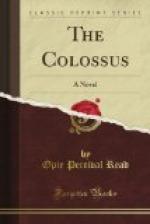“I feel that I shan’t know how to act.”
Witherspoon looked at his daughter and said, “Ellen.”
“But, papa, I just know I shan’t. How should I know? I never met a brother before; never even thought of such a thing.”
“Don’t be foolish. We are not the only people that have been placed in such a position. No matter how you may be situated, remember that you are not a pioneer; no human strain is new.”
“But it’s the only time I was ever placed in such a position.”
“Nonsense. In this life we must learn to expect anything.” Mrs. Witherspoon was silently weeping. “Caroline, don’t, please. Remember that we are not alone. A trial of joy, my dear, is the easiest trial to bear.”
“Not always,” she replied.
A counter commotion in the general tumult—the train.
A crowd waited outside the iron gate. A tall young man came through with the hastening throng. He caught Witherspoon’s wandering eye. Strangers looking for each other are guided by a peculiar instinct, but Witherspoon stood questioning that instinct. The mother could see nothing with distinctness. The young man held up a gold chain.
It was soon over. People who were hastening toward a train turned to look upon a flurry of emotion—a mother faint with joy; a strong man stammering words of welcome; a girl seemingly thrilled with a new prerogative; a stranger in a nest of affection.
“Come, let us get into the carriage,” said Witherspoon. “Come, Caroline, you have behaved nobly, and don’t spoil it all now.”
She gave her husband a quick though a meek glance and took Henry’s arm. When the others had seated themselves in the carriage, Witherspoon stood for a moment on the curb-stone.
“Drive to the Colossus,” he commanded. Mrs. Witherspoon put out her hand with a pleading gesture. “You are not going there before you go home, are you, dear?” she asked.
“I am compelled to go there, but I’ll stay only a moment or two,” he answered. “I’ll simply hop out for a minute and leave the rest of you in the carriage. There’s something on hand that needs my attention at once. Drive to the Colossus,” he said as he stepped into the carriage. A moment later he remarked: “Henry, you are different from what I expected. I thought you were light.”
“He is just like my mother’s people,” Mrs. Witherspoon spoke up. “All the Craigs were dark.”
They drove on in a silence not wholly free from embarrassment. Through the carriage windows Henry caught glimpses of a world of hurry. The streets, dark and dangerous with traffic, stretched far away and ended in a cloud of smoke. “It will take time to realize all this,” the young men mused, and meeting the upturned eyes of Mrs. Witherspoon, who had clasped her hands over his shoulder, he said:
“Mother, I hope you are not disappointed in me.”
“You are just like the Craigs,” she insisted. “They were dark. And Uncle Louis was so dark that he might have been taken for an Italian, and Uncle Harvey”—She hesitated and glanced at her husband.




